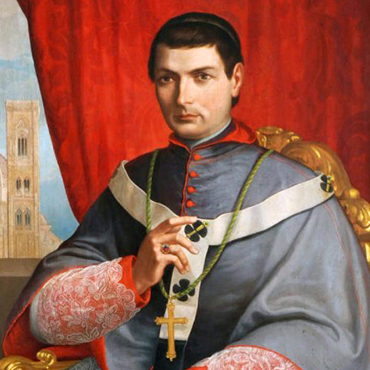Limberti was born in Grignano di Prato from a family of countryfolk and, after the early death of his parents, he was brought up by two uncles, both priests. He studied firstly at the Collegio Cicognini at the time when Giuseppe Slvestri was headmaster and Atto Vannucci and Giuseppe Arcangeli were teachers. Afterwards he entered the seminary in Prato, where he played an active role in the Accademia Gherardiana that had been founded by its principal Giuseppe Targioni, and became its secretary and “consul”. He was gifted in classical and literary studies and he took holy orders in 1844. In 1848, having been involved in the upheavals of the Risorgimento, he became a canon in Prato Cathedral and in 1851 assistant to the bishop.
He was a city councillor responsible to the government for high schools, and in 1852 he became temporary principal of the Collegio Cicognini, taking on the task of modernising teaching methods. When in 1854 an outbreak of cholera, which had spread from India to England, broke out in all the Italian states, he was asked to be a member of the health commission. In 1857 Pope Pius IX made him Archbishop of Florence.
Openly hostile to those critical of the clergy and to the freemasons, so much so as to be given the nickname of the “peasant from Prato” and even to cause demonstrations in the streets, he had difficult relationships also with the civil authorities and the government of the Grand Duchy: he is remembered for having symbolically refused to go down the steps of the Cathedral to welcome Bettino Ricasoli. On the other hand, he did not hesitate to celebrate solemn masses in the presence of Vittorio Emanuele II, both on the occasion of his inauguration as King of Italy in the capital Florence and on the laying of the first stone for the new façade of the Cathedral of Santa Maria del Fiore. His intransigence in demanding a united Catholic Church and a pope who was free to exercise his power in complete autonomy from the civil authorities (as seen in his battles against any tax on ecclesiastical property) had an effect also on the administration of the Archdiocese of Florence and created dissent from the priests that were under him.
He was fond of Raffaello Caverni, whom he held in high regard. He called him to be a teacher at the seminary in Firenzuola and supported him, partly through his vicar general Amerigo Barsi, in his desire to be installed in the parish of Quarate, despite the case brought against him by Niccolò Quaratesi. During a stay at his villa in Scandicci, Limberti died suddenly and prematurely in 1874.

